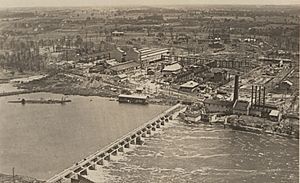Imperial Munitions Board facts for kids
The Imperial Munitions Board (IMB) was a special organization in Canada during the First World War. It was like the Canadian office for the British Ministry of Munitions. The IMB was created to help solve a big problem called the Shell Crisis of 1915, when Britain needed many more artillery shells.
The main job of the IMB was to arrange for the making of war materials in Canada. These materials were for the British government. The IMB was also the main buyer for the British Army, Navy, and Air Force in Canada. It even helped the United States buy supplies.
Contents
How the IMB Started and Was Organized
When World War I began, Britain asked Canada for help with shells. In September 1914, a group called the Shell Committee was formed. This committee was supposed to help get shells made in Canada.
However, there were some problems with how the Shell Committee gave out contracts. To fix this, the British government decided to create a new, more organized group. This new group was the Imperial Munitions Board (IMB).
In December 1915, the IMB was officially formed. Joseph Wesley Flavelle became its chairman, which meant he was in charge. The IMB had many different departments. These departments handled things like buying steel, building ships, making explosives, and producing aircraft.
Flavelle had full power to manage the IMB. He made sure that factories either started making their promised war supplies or lost their contracts. This helped make sure production was efficient.
What Canada Produced
The IMB helped Canada become a huge producer of war supplies. By 1917, the IMB was working with 650 factories. These factories were in 144 different towns across Canada.
Canada made many types of shells, from small ones to very large ones. For example, Canada produced more than half of all the small shrapnel shells for Britain. It also made a lot of other shells, like 4.5-inch and 6-inch shells.
Besides shells, Canada also supplied many other important things. These included:
- Parts for ammunition
- Explosives like TNT
- Chemicals like acetone
- Metals like aluminum and nickel
- Parts for airplanes
- Farm machinery
- Lots of timber (wood)
- Railway materials, including miles of train tracks sent to France
Special Factories (National Plants)
Sometimes, private companies could not make certain things. So, the IMB built its own special factories. These were called "National plants."
The IMB built seven of these plants to make explosives and propellants (the stuff that makes shells fly). It also built one factory to make airplanes. The IMB also managed the building of ships and aircraft.
Here are some examples of these important factories:
- Canadian Aeroplanes Ltd. in Toronto, Ontario: This factory made airplanes like the JN-4(Can) Canuck. It was built very quickly, in just two and a half months!
- British Cordite Ltd. in Nobel, Ontario: This plant made cordite, which is a type of explosive. It was a large site with many buildings.
- British Chemical Co. Ltd. in Trenton, Ontario: This factory made different acids and explosives like TNT. It was the biggest ammunition factory in the British Empire at the time.
- British Forgings Ltd. in Toronto, Ontario: This plant recycled steel from shell production. It melted down metal scraps and turned them into new steel. It was the world's largest electric steel plant.
- British Munitions Supply Co. Ltd. in Verdun, Quebec: This factory assembled fuses for shells. It had 4,000 employees, mostly women, who assembled millions of fuses.
- Energite Explosives Co. Ltd. in Haileybury, Ontario: This operation loaded and assembled shells. It had 800 employees and produced millions of completed shells.
The End of the IMB
The Imperial Munitions Board finished its work in 1919. This process started right after the end of World War I in November 1918.
The British government gave instructions on how to close down the IMB:
- First, all production of shells and explosives stopped right away.
- Then, they slowly stopped making items that were no longer needed for the war.
- Finally, they kept some contracts going for things that were still useful, like timber and ships.
Impact on Workers
When the IMB took over from the Shell Committee, there was a change in how workers were treated. The IMB decided not to include "fair wage" rules in new contracts. This meant that companies did not have to guarantee a certain wage for their workers.
This decision caused problems with worker groups in Canada. It led to some strikes in 1918 and bigger worker protests in 1919.
Images for kids
 | Georgia Louise Harris Brown |
 | Julian Abele |
 | Norma Merrick Sklarek |
 | William Sidney Pittman |



